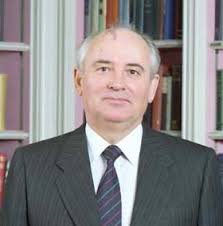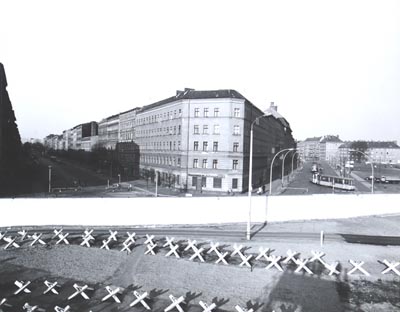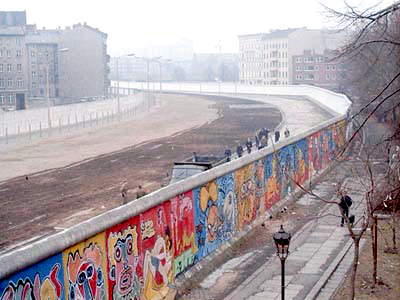
Mikhail Gorbachev was instrumental in the fall of the Berlin wall and the end of the cold war.

"The Anti Fascist Protection Barrier".

The Berlin wall was used as a canvas for many artists.

Czechoslovakia Uprising
The story tells that in 1968, year of the French May contentious and student riots that shocked many places, the world's eyes were also on Czechoslovakia and its capital, where throughout the year a process - dubbed the "Prague Spring" - which seemed to herald the crisis of the Soviet empire.... But that August many awoke from the dream. When you turn on the radio a broken voice frustration and pain, announced the end of hope. Dubcek spoke to the people to say goodbye to that spring.
Hard Czechoslovak communist regime that endured from 1948 embodied in the figure of Novotny made crises 20 years later. After the resignation which was forced Novotny, Alexander Dubcek became first secretary of the party president and Svoboda Cernik as premier.
In this occurrence he was followed by what became known as "Dubcek's Spring". New ideas such as decentralization of industry, more power to the unions, freedom to travel abroad, freedom of speech and press, and many other measures forming package policy decisions by which the government intended to respond to popular desires and earn the right to power, was the attempt to implement "socialism with a human face".
As much as the newcomers acted cautiously assuring the Russians that Czechoslovakia would keep his covenant and respect the Warsaw Pact (1955), as the plan was developed, the Russian alarm increased. By August a massive invasion of Soviet troops ended up deposing Dubcek to finish putting in place someone more docile: Husak.
The Czechoslovak people, who had enjoyed for some time that Prague Spring, looked like the 20 August 1968 Soviet tanks entered the capital (now the Czech Republic) 600,000 troops, 2,300 tanks and 700 aircraft. The 60s had given way to revisionism Stalinist regime and Czechoslovakia was one of the first revolutionaries to seek a change.
Slovak Dubcek (Czech communist party secretary, CPC) was the one who carried out the attempt supported by the intellectual vanguard and the majority of the people who had only complaints silenced by terror against the Soviet regime. But this was seen as a bad example for world communism and Moscow had enough.
The people expressed through peaceful resistance which also gave a toll of dozens of deaths, mostly young, as one student under the great equestrian statue of St. Wenceslas (King of Bohemia and Martyr) .
Dubcek was taken to the Kremlin and forced to sign a pledge. Upon his return, sobbing of helplessness and shame, gave a radio speech in which he recommended the submission to avoid a bloodbath. Thus saved sentences and executions.
